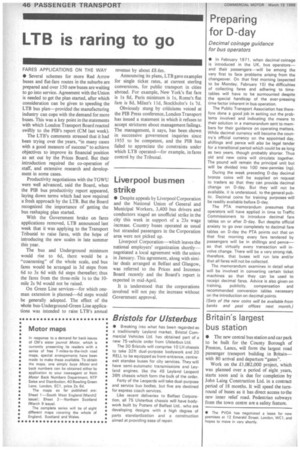Preparing for D-day
Page 48

If you've noticed an error in this article please click here to report it so we can fix it.
Decimal coinage guidance for bus operators
• In February 1971, when decimal coinage is introduced in the UK, bus operators— and their passengers—will be among the very first to face problems arising from the changeover. On that first morning (expected to be Monday. February 15) the difficulties of collecting fares and adhering to timetables will have to be surmounted despite the special handicap of the ever-pressing time factor inherent in bus operation.
The Public Transport Association has therefore done a good job in setting out the problems involved and indicating the means to their solution in a memorandum sent to members for their guidance on operating matters. While decimal currency will become the country's official currency on the appointed day, shillings and pence will also be legal tender for a transitional period which could be as long as two years, though probably shorter. Thus old and new coins will circulate together. The pound will remain the principal unit but will be divided into 100 new-pennies (np).
During the week preceding D-day decimal bronze coins will be supplied on request to traders so that they can provide decimal change on D-day. But they will not be available, it is understood, to the general public. Decimal coins for training purposes will be readily available before D-day.
The PTA memorandum presumes that operators will have applied in time to Traffic Commissioners to introduce decimal fare tables on or after D-day. But despite official anxiety to go over completely to decimal fare tables on D-day the PTA points out that on that first morning every fare tendered by passengers will be in shillings and pence— so that virtually every transaction will involve change. There will be a very strong risk, therefore, that buses will run late and/or that all fares will not be collected.
The memorandum examines in detail what will be involved in converting certain ticket machines so that they can be used to receipt decimal fares. Advice is also given on training, publicity, compensation and recommended conversion tables necessary on the introduction on decimal points.
(Sets of the new coins will be available from banks and post offices next month.)




































































































































